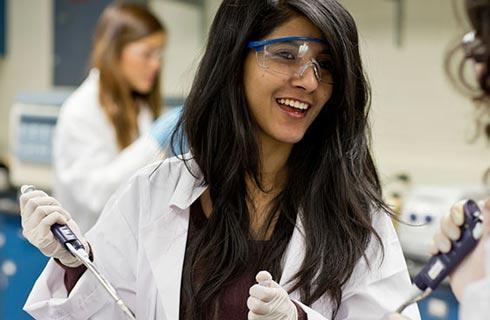- IDP China>
- 课程库>
- 工程与技术>
- 工程学及其相关技术>
- 其他工程及相关技术>
- MEng Biomedical Engineering (Electronics) with Foundation Year
工学学士(荣誉)生物医学电子工程
MEng Biomedical Engineering (Electronics) with Foundation Year

学历文凭
Undergraduate Masters

专业院系
Biomedical Engineering

开学时间

课程时长

课程学费

国际学生入学条件
You will need a Grade B/6 in GCSE Mathematics and a Grade C/4 in GCSE English language or equivalent. In addition to meeting the GCSE requirements, you will also need to achieve the required grades in one of the following qualifications. GCE A-Level : Grades ABB. There are no specific subject requirements, except for the Chemical Engineering pathway, which requires A-level Chemistry. However, there are restricted subjects or restricted subject combinations, depending on your chosen progression pathway. International Baccalaureate Diploma : 32 points overall, including 5 points in Standard or Higher Level Mathematics (Analysis and approaches or Applications and interpretation). There are no specific subject requirements, except for Chemical Engineering, which requires Higher Level Chemistry.
IDP—雅思考试联合主办方

雅思考试总分
6.5
- 雅思总分:6.5
- 托福网考总分:92
- 托福笔试总分:160
- 其他语言考试:Pearson Test of English (PTE) Academic - 68
CRICOS代码: HH16
申请截止日期: 请与IDP联系 以获取详细信息。
课程简介
This Foundation Year provides an introduction to mathematics, mechanics, computer programming, electricity and electronics, and the principles of engineering. Our Foundation Year is for students who are either:<br>changing their direction of studyor from countries that do not offer A-levels or an equivalentThis course is ideal if you haven’t studied the required A-level subjects or equivalents, for direct entry to your chosen degree.<br>If you have already studied A-levels or an equivalent in mathematics and any other subject required for your chosen course, you cannot apply through this route.<br>This intensive year of study includes both theoretical and practical activities. It is for motivated students who want to make a change of direction in their studies.<br><br>
相关申请
 预科
预科 奖学金
奖学金 实习机会
实习机会 在校学习
在校学习 跨境学习
跨境学习 校园授课-线上开始
校园授课-线上开始 在线/远程学习
在线/远程学习
开学时间&学费
学费信息仅供参考,请与IDP联系以获取详细信息
| 开学时间 | 时长 | 学费 | 地点 |
|---|
学校排名

世界排名118
数据源:
泰晤士高等教育世界大学排名
关于南安普顿大学

南安普顿大学在2023年QS世界大学排名中名列第78位,它在英国的大学中排名前15位(《2023年完全大学指南》)。南安普顿大学是著名的研究密集型大学联盟罗素集团的创始成员之一。南安普顿大学为学生提供了300多门学位课程。它每年还提供约400个实习机会,帮助学生获得充分的实践机会。该大学聘请了杰出的讲师,他们往往是其专业领域的领导者,确保学生了解最新的研究发展。作为一所具有广阔前景和以学生为中心的全球性大学,来自130多个国家和地区的1万多名国际学生在该大学学习。根据2022年全国学生调查,82%的学生对其课程教学感到满意。该大学对校内设施进行了投资。该机构还提供获奖的学习中心和职业支持服务。南安普顿的研究人员在不同的校内研究机构从事着有影响力的研究工作。像RJ-米切尔风洞和高压实验室这样的尖端设施表明,该大学投资于人员和服务,使他们受益。国际学生可以获得负担得起的舒适住宿,也可以从其他服务中受益,满足他们的安全和福祉,如24小时保安和包括南安普顿大学住宿的UniLink公交卡。南安普顿大学有300多个不同的学生团体,代表了多种多样的兴趣爱好。这包括40个不同的表演艺术团体和90多个体育俱乐部,优秀的学生有机会代表南安普顿参加大学间的比赛。
本校相关课程

综合博士学位应用语言学/英语教学
学历文凭
Ph.D.
开学日期
课程费用总额


工学(荣誉)船科学
学历文凭
Bachelor Degree
开学日期
课程费用总额


平面艺术学士(荣誉)学位
学历文凭
Bachelor Degree with Honours
开学日期
课程费用总额


机械(荣誉)机械工程/可持续能源系统
学历文凭
Bachelor Degree
开学日期
课程费用总额


工学(荣誉)机械工程/海军工程
学历文凭
Undergraduate Masters
开学日期
课程费用总额


工学士(荣誉)机械工程/机电一体化
学历文凭
Bachelor Degree
开学日期
课程费用总额

其他相关课程

利兹ISC国际预科课程-科学,工程与计算机-利兹国际学习中心-ISC研究组
 Study Group学习集团(英国)
Study Group学习集团(英国)学历文凭
Foundation for Undergraduate
开学日期
课程费用总额


Master of Renewable and Future Energy
 西澳大学
西澳大学学历文凭
Masters Degree (Coursework)
开学日期
课程费用总额


MRes Acoustics
 南安普顿大学
南安普顿大学泰晤士高等教育世界大学排名:129
学历文凭
Masters Degree (Research)
开学日期
课程费用总额


专业工程学硕士
 科廷大学
科廷大学泰晤士高等教育世界大学排名:256
学历文凭
Masters Degree (Coursework)
开学日期
课程费用总额


New Zealand Certificate in Study and Career Preparation (Bachelor of Engineering Pathway) (Level 4)
 Ara坎特伯雷理工学院
Ara坎特伯雷理工学院学历文凭
Certificate level 4
开学日期
课程费用总额


工程师文凭(标准)
 悉尼科技大学学院
悉尼科技大学学院学历文凭
Diploma
开学日期
课程费用总额










